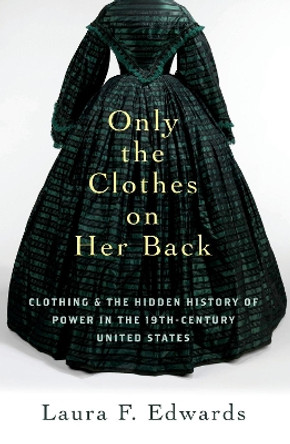Description
About the Author
Laura F. Edwards is the Class of 1921 Bicentennial Professor of American Law and Liberty at Princeton University. She is the award-winning author of A Legal History of the Civil War and Reconstruction: A Nation of Rights, The People and Their Peace: Legal Culture and the Transformation of Inequality in the Post-Revolutionary South, and Scarlett Doesn't Live Here Anymore: Southern Women in the Civil War Era. This is her first project that connects her longstanding needlework interests with her historical work.
Reviews
Only the Clothes on Her Back is an illuminating book-one likely to refashion our understanidng of American economic, legal, material and social history. * Eva Sheppard Wolf, Journal of Southern History *
Reading Only the Clothes on Her Back is a unique experience because Edwards (Princeton Univ.) makes economic history enjoyable...Edwards has written an analysis of aspects of fabrics that this reviewer did not know existed and written it very well indeed. * Choice *
A masterpiece....well-written, deeply thought-provoking....Edwards has clearly poured her expertise into this account of the history of textiles in the USA and their unique legal standing. Using elements of microhistory, Edwards presents detailed case studies to cement her argument and emphasizes the importance of garments to women who otherwise had little to no legal standing. Marginalized people, largely women and slaves, could own textiles, trade them, and expect courts to maintain their claim to the items.... Edwards teases out the strands of this tangled web of textile history and excellently portrays the connection between fabric and burgeoning globalization....While focusing almost entirely on the USA, the global nature of the subject makes excellent reading for historians of all nations. * Caroline M. McWilliams, Twentieth Century British History *
Reading Only the Clothes on Her Back is a unique experience because Edwards makes economic history enjoyable. Looking at the implications of women's roles in cloth production, she argues that textiles and finished garments constituted a rare commodity that even married women, unmarried daughters, and/or enslaved women controlled apart from their husbands and masters. Each chapter begins with a well-researched anecdote about some aspect of the trade, which does double duty, imbuing what otherwise might be just dry facts with humanity and also infusing the book with humor-the stories are often hilarious....Edwards has written an analysis of aspects of fabrics that this reviewer did not know existed and written it very well indeed. Highly recommended. General readers through faculty. * Choice *
Laura Edwards has produced a masterpiece that forever changes how we see the nineteenth century's ubiquitous textiles and the women who worked, stole, hoarded and wore them. Only a scholar like Edwards, with insights that go beyond conventional notions of property and ownership, could recover the astonishing stories about how those without rights still exercised legal dominion over fabric and their economic lives. Only the Clothes on Her Back smartly debunks simple cultural truisms about women and their adornments, revealing how ordinary Americans, even those marginalized in public law, connected to global markets and remade those forces by their own terms in the local courthouses of the early Republic. * Martha S. Jones, author of Birthright Citizens: A History of Race and Rights in Antebellum America *
With elegance, creativity, and a fitting touch of wit, Laura Edwards unfolds the world of early American textiles in this brilliantly original study of gender, race, material exchange, and the law. The seemingly small arena of gowns, sheets, and hosiery as revealed through her careful research proves massively impactful to those who were marginalized by society as well as to merchants and manufacturers. While enslaved people, free Blacks, and white women could not claim personal rights, they could and did own all manner of fabrics, which they saved, traded, and defended in a complex legal culture that defies our modern expectations but would not last. The Clothes on Her Back transforms our understanding not only of lace, looms, and law, but also of nineteenth-century American lives. * Tiya Miles, author of All That She Carried: The Journey of Ashley's Sack, a Black Family Keepsake *
In Only the Clothes on Her Back, Laura Edwards combines daunting archival research with a brilliant synthesis of generations of scholarship to put women, both Black and white, at the heart of American legal and economic history between the Revolution and the Civil War. Laced with wit, and knitting race, class, and gender into a seamless fabric, Edwards poignantly and powerfully brings home what was gained and lost when America became 'a nation of rights.' * Dylan C. Penningroth, University of California, Berkeley *
In this revelatory book, Laura Edwards explains the extraordinary significance that textiles once held in the American economy and legal system. A book of scrupulous research and a profoundly revisionist account of the workings of property, gender and the law in America between the Revolution and the 1860s. * Deborah Cohen, Northwestern University *
In Only the Clothes on Her Back, Edwards has addressed an important but underexplored aspect of nineteenth-century economic life. She reveals the ways in which textiles shaped, and were shaped by, people at the margins of economic and legal culture in America. She shows how clothing can be a useful and generative lens through which to understand law and power in the nineteenth century. Edwards's triumph is that she has shown through her deft and incisive analysis that textiles influenced much more than the clothes that people wore. Instead, textiles shaped the very nature of law and economy during the nineteenth century. * Justene Hill Edwards, H-Diplo *
The study is truly a tour de force showcasing deft analysis, deep creativity, and penetrating research. Readers will find this book deeply rewarding and incredibly enlightening. * James J. Broomall, The Journal of the Civil War Era *
Laura F. Edwards... has written a book... [that] decidedly recasts our understanding of the material struggles of some of the 'dependent classes' (married women, slaves, servants) to which most Americans belonged in those decades... Making use of diligent, painstaking research in often untouched, sometimes crumbling local court records, Edwards persuasively demonstrates that in the unsystematized, highly decentralized American legal system before the Civil War, people without the right to property nonetheless owned it and had the opportunity to secure it in court... In its research, its interpretation, and its implications, Only the Clothes on Her Back is unspeakably significant. * Robert Westbrook, Journal of American History *
Edwards's new study... reveal[s] the national scope of the ephemeral post-Revolutionary localized political culture that offered protection to the propertyless. But it does a great deal more: it illuminates a hidden history of female economic power grounded in the ownership of textiles.... Edwards makes it clear that the legal principles that governed the textile market were highly regulated, widely understood, and enforced by courts throughout the republic without open acknowledgment. * Amy S. Greenberg, American Historical Review *
This book is helpful in drawing our attention to the perhaps usually invisible legal principles behind the ownership of these objects. * Rebecca Jumper Matheson, Nineteenth Century *
Awards
Winner of Winner, John Phillip Reid Book Award, American Society for Legal History Winner, 2023 Society for Historians of the Early American Republic Book Prize Winner, Merle Curti Social History Award, Organization of American Historians.
Book Information
ISBN 9780197568576
Author Laura F. Edwards
Format Hardback
Page Count 456
Imprint Oxford University Press Inc
Publisher Oxford University Press Inc
Weight(grams) 1g
Dimensions(mm) 165mm * 237mm * 32mm






